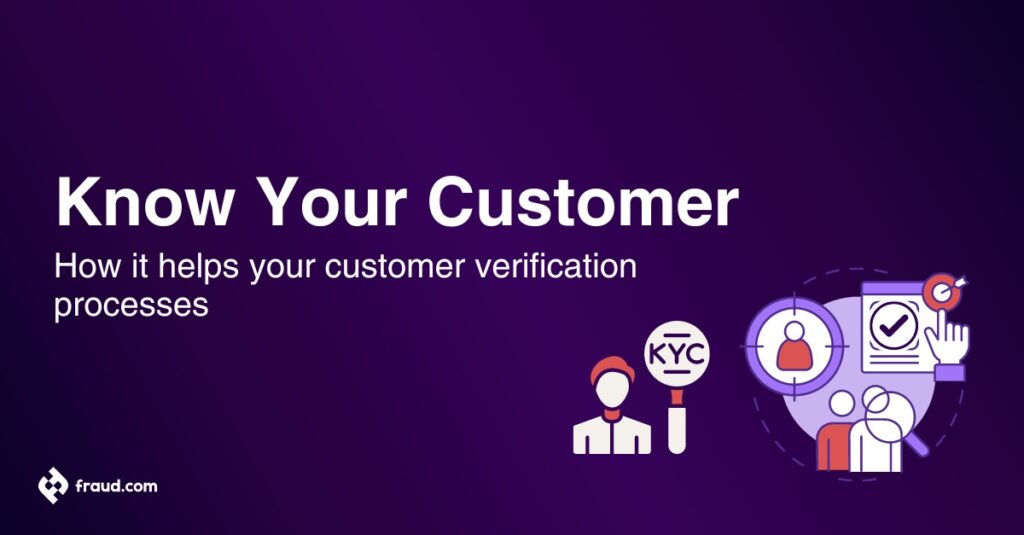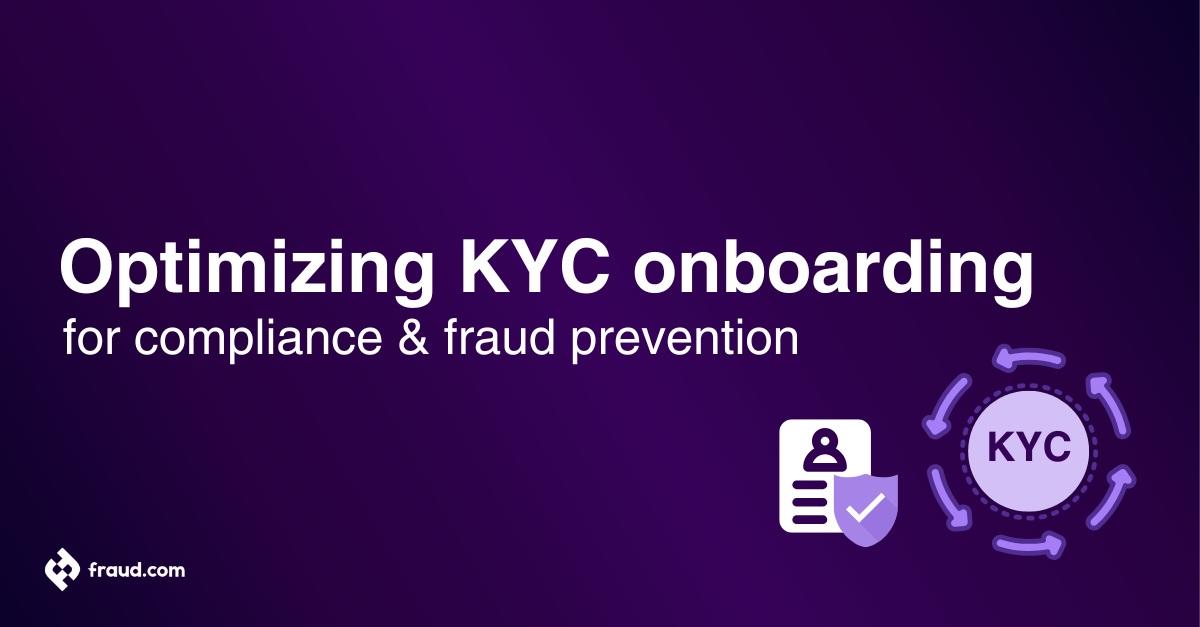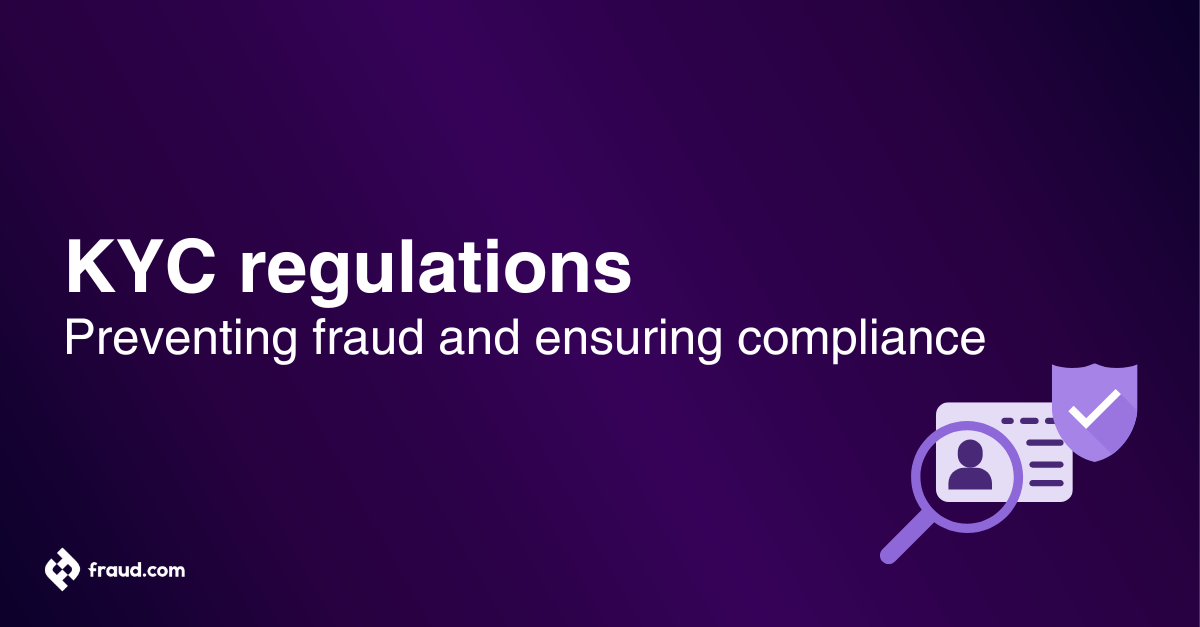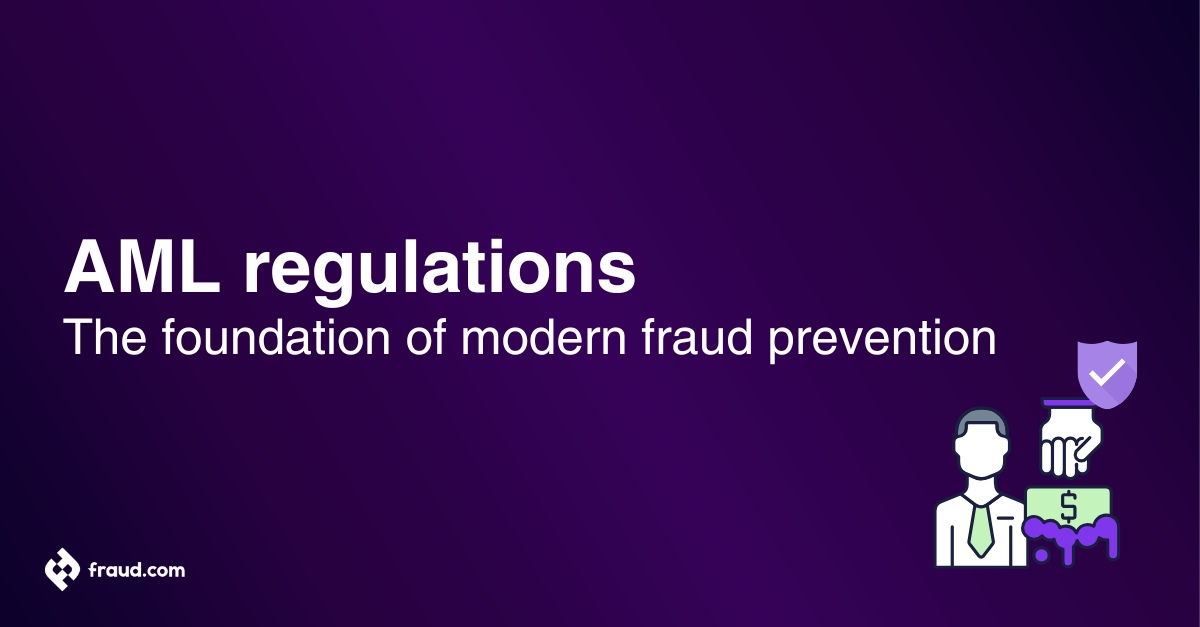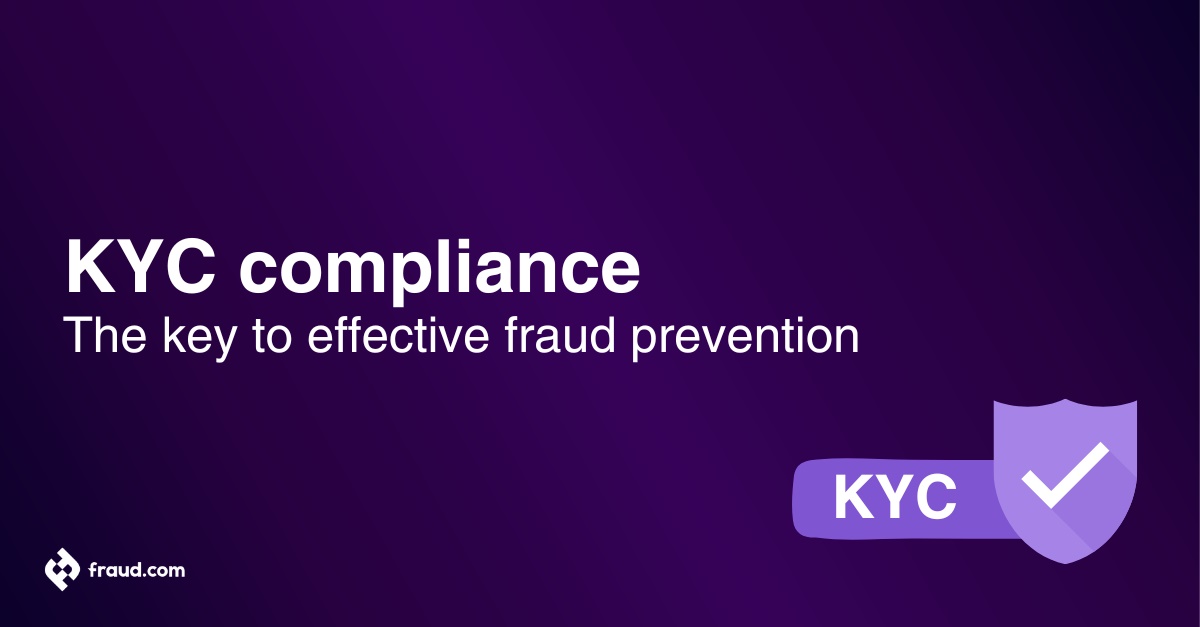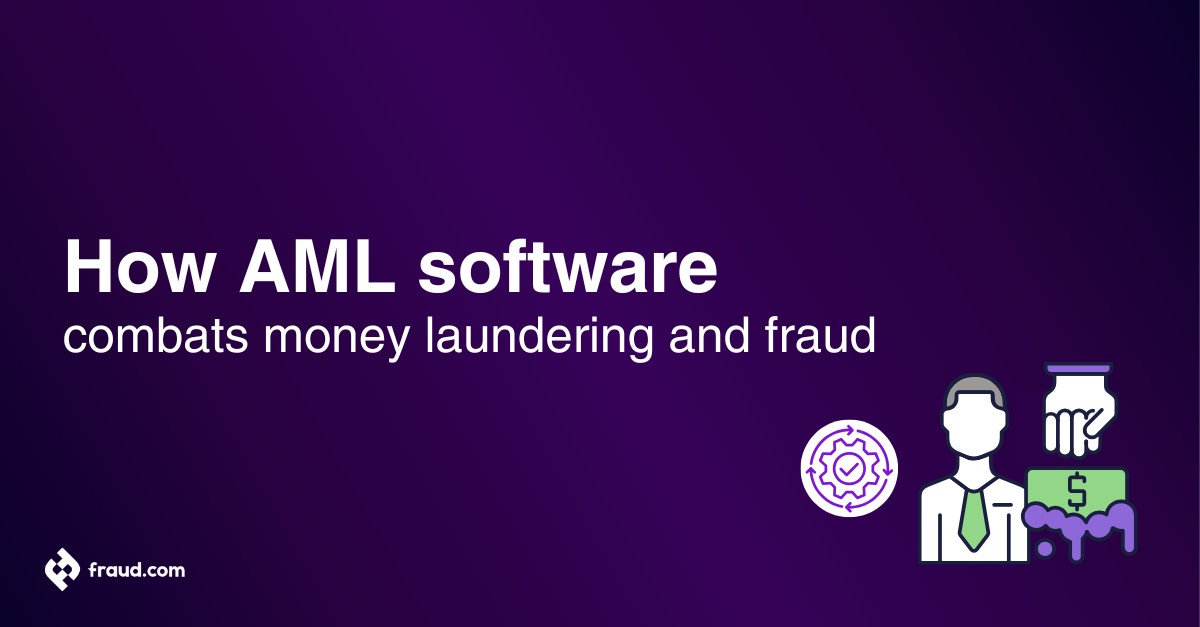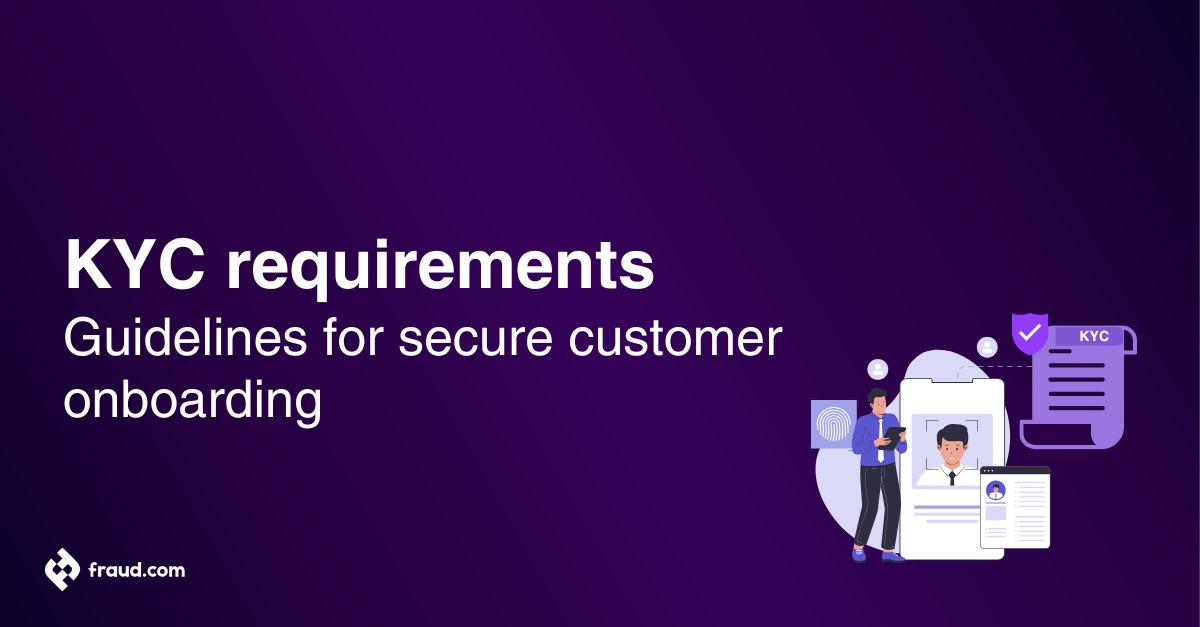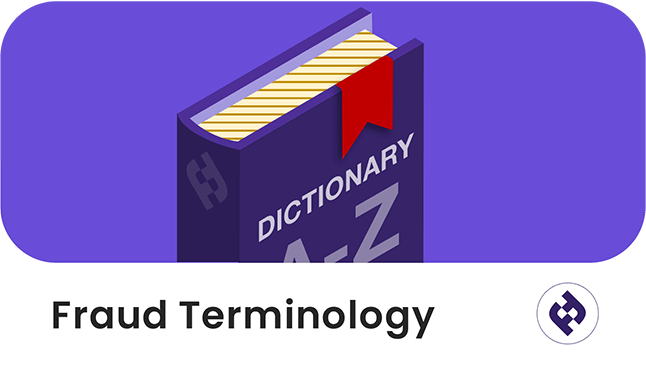Your customers are the lifeblood of your business – without them, you wouldn’t be in operation. So, it’s important that you ‘Know Your Customer’ and take steps to verify their identity and protect their information. The fact is fraud threats and identity theft is increasing, and businesses need to do everything they can to prevent it. Know Your Customer (KYC) is one way to verify customer identities and protect your business.
If your company deals with customer data – whether it’s financial data, personal data, or both – then you need to have a KYC process in place. In today’s article, we’ll explain what KYC is, how it works, and how it can benefit your business.
Table of Contents
ToggleWhat Is KYC?
KYC stands for Know Your Customer. It’s a process that businesses use to verify the identity of their customers. The goal of KYC is to prevent fraud by ensuring that businesses know who their customers really are.
To complete the KYC process, businesses must collect certain information from their customers. This usually includes the customer’s full name, date of birth, address, and identification number, such as a national identity number or passport number. The exact information required may vary depending on the country or jurisdiction in which the business operates.
In some cases, businesses may also need to collect additional information, such as proof of address or a copy of the customer’s passport. This is typically done for high-risk customers, such as those who are opening a new account or applying for a loan.
Once the KYC process is complete, businesses will have a better understanding of their customers and can take steps to prevent fraud, such as identity theft, and money laundering.
What Is eKYC?
eKYC refers to digital KYC processes. eKYC stands for electronic Know Your Customer, it also means digital KYC. It’s a paperless and remote way of verifying customer identities. The goal of eKYC is to make the KYC process more efficient and convenient for both, businesses and customers.
There are many benefits of eKYC for businesses. It can help speed up customer onboarding, reduce costs associated with paper-based KYC processes, and improve compliance with Know Your Customer laws and regulations.
For customers, eKYC can make it easier and faster to open new accounts or sign up for new services. It can also help protect their identities by reducing the risk of identity theft and fraud.
eKYC is an important part of Know Your Customer regulations. By using eKYC, businesses can more easily comply with KYC requirements while providing a better experience for their customers and reducing customer friction.
Know Your Customer components
The Know Your Customer (KYC) process encompasses three essential components:
- Customer identification and authentication:
- Verification of identity: This component involves confirming the identity of customers through reliable documentation or data. It includes verifying personal details against official records to ensure accuracy.
- Documentary evidence: Organizations collect official documents such as passports or IDs to validate the identity of customers. These documents serve as tangible proof of identity and help establish trustworthiness.
- Biometric authentication: Adopting biometric data, such as fingerprints or facial recognition, adds an extra layer of security and accuracy to the identification process, enhancing overall authentication measures.
- Risk assessment and due diligence:
- Customer risk profiling: Categorizing customers based on factors like the source of funds or geographical location enables organizations to assess their risk levels. This profiling helps prioritize due diligence efforts and allocate resources effectively.
- Enhanced Due Diligence (EDD): Conducting deeper investigations for high-risk customers, such as politically exposed persons (PEPs), involves scrutinizing backgrounds and activities to mitigate potential risks associated with these individuals or entities.
- Ongoing monitoring and compliance:
- Transaction monitoring: Continuously monitoring customer transactions allows organizations to detect and prevent suspicious activities, such as money laundering or terrorist financing. Automated systems analyze transaction patterns and flag any anomalies for further investigation.
- Periodic review: Regularly updating customer profiles ensures that KYC information remains accurate and up-to-date, reflecting any changes in behaviour or risk levels over time. This proactive approach helps organizations stay vigilant and responsive to evolving threats.
- Record-keeping: Maintaining comprehensive records of KYC processes is crucial for regulatory compliance. Detailed documentation facilitates compliance checks and audits, ensuring transparency and accountability.
- Audit trail: Establishing transparent audit trails demonstrates regulatory compliance and adherence to KYC procedures. It provides a trail of compliance and evidence of due diligence efforts, enabling organizations to address any regulatory inquiries effectively.
- Employee training and awareness program: Educating staff on KYC regulations and procedures ensures they have the necessary knowledge and skills to comply with requirements, reducing the risk of non-compliance. Additionally, informing customers about the importance of KYC compliance fosters transparency and cooperation, promoting a culture of compliance and mutual trust.
KYC Process
The “Know Your Customer” process involves three essential steps:
- Customer Identification Program (CIP): In the Customer Identification Program (CIP), organizations establish procedures to verify the identity of customers using reliable documentation, data, or information. This step ensures that customers are accurately identified before any business relationship is established, laying the groundwork for trust and transparency.
- Customer Due Diligence (CDD): Customer Due Diligence (CDD) is the process of assessing the risk associated with each customer by conducting a thorough analysis of their background, source of funds, and transaction patterns. By performing CDD, organizations gain insights into the nature of their customers’ activities, enabling them to identify potential risks and tailor risk management strategies accordingly.
- Enhanced Due Diligence (EDD): Enhanced Due Diligence (EDD) measures are necessary for high-risk customers, such as politically exposed persons (PEPs) or those from high-risk jurisdictions. EDD involves conducting additional verification steps and deeper investigations into the background and activities of these customers to mitigate potential risks associated with them.
By following these essential steps in the Know Your Customer process, organizations can effectively verify customer identities, assess associated risks, and implement appropriate measures to mitigate financial crime and regulatory compliance risks.
Best practices in KYC
- Effective use of KYC technology:
- Adopt advanced KYC technologies to streamline processes, enhance accuracy, and improve efficiency in customer identification, due diligence, and monitoring activities. Leverage tools such as automated identity verification, biometric authentication, and AI-powered risk analysis to strengthen KYC practices and mitigate financial crime risks.
- Robust customer identification:
- Establish comprehensive procedures for customer identification, including reliable document verification, biometric authentication, and enhanced screening processes to ensure accurate and reliable identification.
- Thorough Customer Due Diligence:
- Conduct thorough CDD, including background checks, source of funds verification, and transaction pattern analysis, to understand the nature of the customer’s activities and assess associated risks.
- Enhanced Due Diligence for High-risk customers:
- Implement enhanced due diligence measures for high-risk customers, such as politically exposed persons (PEPs) and those from high-risk jurisdictions, including additional verification steps and deeper investigations into their background and activities.
- Ongoing monitoring and review:
- Continuously monitor customer transactions and behavior to detect any suspicious activities or changes in risk profiles. Conduct regular reviews of customer profiles to ensure KYC information remains accurate and up-to-date.
By adhering to these best practices in KYC, organizations can strengthen their risk management capabilities, ensure regulatory compliance, and build trust with customers and stakeholders.
Know Your Customer requirements
In the industry of financial services and beyond, adhering to Know Your Customer (KYC) requirements is not merely a regulatory checkbox but a fundamental aspect of responsible business conduct. These requirements outline the careful procedures organizations must follow to understand the identities, intentions, and risk profiles of their customers. Below are some essential components of KYC requirements:
Range of requirements across countries and industries:
- Customer identification: To establish the identity of customers, organizations rely on several methods. Verification of identity involves confirming customers’ identities using reliable documentation or data. This often includes collecting official documents like passports or IDs for identity validation. Additionally, some organizations adopt biometric authentication, adopting biometric data such as fingerprints or facial recognition for enhanced security and accuracy.
- Risk assessment: Understanding the risk associated with each customer is essential. Customer Risk Profiling involves categorizing customers based on factors like the source of funds or geographical location to assess their risk levels. For high-risk customers, such as politically exposed persons (PEPs), Enhanced Due Diligence (EDD) is conducted, requiring deeper investigations into their backgrounds and activities.
- Ongoing monitoring: To detect and prevent suspicious activities, organizations engage in continuous monitoring of customer transactions. Transaction Monitoring involves scrutinizing transactional behaviour for anomalies or red flags. Additionally, periodic reviews are conducted to update customer profiles, reflecting any changes in behaviour or risk levels over time.
- Compliance documentation: Maintaining comprehensive records of KYC processes is crucial for regulatory compliance. Record-keeping ensures that organizations have detailed documentation of their KYC efforts, facilitating compliance checks and audits. Similarly, establishing transparent audit trails and reports is necessary to demonstrate regulatory compliance and adherence to KYC procedures.
- Training and awareness: To effectively implement KYC regulations, organizations invest in employee training programs. These programs educate staff on KYC regulations and procedures, ensuring they have the necessary knowledge and skills to comply with requirements. Furthermore, awareness programs inform customers about the importance of KYC compliance and their role in the process, fostering transparency and cooperation between organizations and their clients.
Requirements in the United States:
KYC regulations originated from years of unchecked financial crimes. The initial guidelines were drafted in 1970 when the U.S. passed the Bank Secrecy Act (BSA) to prevent money laundering. Notable additions came years later, after the Sept. 11, 2001 terrorist attacks and 2008 global financial crisis. These events underscored the urgent need for robust measures to combat illicit financial activities, leading to the evolution of KYC regulations to their current form. The regulations put in place over the years have required firms to monitor client behaviour regularly, ensuring ongoing compliance and proactive risk management.
Requirements in the United Kingdom:
The United Kingdom has its own set of Know Your Customer (KYC) requirements, which are established and enforced by regulatory bodies such as the Financial Action Task Force (FATF), the Financial Conduct Authority (FCA) and the Joint Money Laundering Steering Group (JMLSG). These requirements align with international standards while also reflecting the specific regulatory landscape of the UK financial sector.
Key KYC Requirements:
- Anti-Money Laundering (AML) regulations:
- UK firms are subject to stringent AML regulations, which mandate the implementation of KYC procedures to prevent money laundering and terrorist financing.
- Customer Due Diligence (CDD):
- UK firms are required to conduct thorough CDD on their customers, including individuals, businesses, and entities.
- Enhanced Due Diligence (EDD):
- In cases where customers present a higher risk, such as politically exposed persons (PEPs) or those from high-risk jurisdictions, UK firms must perform enhanced due diligence.
- Ongoing monitoring:
- UK firms are obligated to continuously monitor customer transactions and behaviour to detect any suspicious activity.
- Record-keeping:
- UK firms are required to maintain comprehensive records of their KYC processes and customer interactions.
- Training and awareness:
- UK firms must ensure that their employees are adequately trained in KYC procedures and AML regulations.
Overall, compliance with UK KYC requirements is essential for financial firms operating within the jurisdiction to mitigate the risk of financial crimes, maintain regulatory compliance, and uphold the integrity of the UK financial system.
KYC documents
In the Know Your Customer (KYC) process, various documents play a crucial role in verifying the identity of customers, assessing risks, and ensuring regulatory compliance. Depending on the specific KYC needs and requirements of each organization, the documents required may vary. These documents serve as evidence of due diligence efforts and are essential for establishing trust between organizations and their clients. Below are some common KYC documents:
- Identification documents:
- Passport
- Driver’s license
- National identity card
- Government-issued ID
- Address verification:
- Utility Bills (e.g., electricity, water, gas)
- Bank statements
- Rental agreement
- Property ownership documents
- Financial Statements:
- Bank statements
- Tax returns
- Investment statements
- Business Documents (for corporate clients):
- Certificate of incorporation
- Memorandum and articles of association
- Business license
- Ownership structure documents
- Additional Documents for High-Risk Customers:
- Politically Exposed Person (PEP) declaration
- Source of funds declaration
- Enhanced Due Diligence (EDD) reports
- Consent Forms:
- Consent to conduct KYC checks
- Privacy policy acknowledgment
These documents provide organizations with the necessary information to verify the identity of customers, assess their risk profiles, and comply with regulatory requirements. Maintaining accurate and up-to-date records of KYC documents is essential for demonstrating compliance during regulatory audits and inspections.
Challenges of KYC
Navigating Know Your Customer (KYC) processes comes with its own set of hurdles. Here are some key challenges organizations face:
- Regulatory complexity: Managing complex and evolving regulatory requirements across jurisdictions.
- Resource demands: Allocating significant financial and human resources to implement and maintain KYC processes.
- Data management and privacy: Handling sensitive customer data while ensuring compliance with privacy regulations.
- Customer experience friction: Balancing stringent and growing KYC requirements with providing a smooth customer experience.
- Technology integration: Integrating KYC solutions with existing systems and platforms.
- Global transactions complexity: Managing KYC for cross-border transactions and customers in multiple jurisdictions.
- Risk assessment accuracy: Ensuring accurate risk assessment and monitoring of customer profiles.
- Legal and reputational risks: Mitigating legal and reputational risks associated with non-compliance with KYC regulations.
Addressing these challenges requires diligence and strategic planning to ensure effective KYC processes while maintaining regulatory compliance and customer satisfaction.
Benefits of KYC
Implementing a robust Know Your Customer (KYC) process offers numerous advantages for organizations across various industries. Here are ten key benefits:
- Enhanced security against financial crimes: KYC helps organizations identify and prevent illicit activities such as money laundering and fraud by accurately verifying customer identities.
- Compliance with regulatory requirements: KYC processes ensure organizations comply with legal mandates set by regulatory authorities, avoiding potential penalties and reputational damage.
- Strengthened customer trust and loyalty: By prioritizing transparency and security, KYC builds confidence in customers, fostering stronger and more enduring relationships.
- Prevention of money laundering and fraud: KYC helps organizations detect and mitigate risks associated with illicit financial activities, safeguarding financial integrity and stability.
- Improved transparency in financial transactions: KYC promotes transparency and accountability, enhancing confidence in the financial system and mitigating risks.
- Efficient allocation of resources: By categorizing customers based on risk profiles, KYC enables organizations to allocate resources more efficiently, maximizing effectiveness and minimizing costs.
- Reduction of operational risks: KYC processes identify and mitigate operational risks associated with high-risk customers and suspicious activities, enhancing organizational resilience.
- Enhanced due diligence on high-risk customers: KYC facilitates deeper investigations into the background and activities of high-risk customers, enabling proactive risk management.
- Protection of organizational reputation: By prioritizing compliance and integrity, KYC helps organizations safeguard their reputation and credibility in the marketplace.
- Competitive advantage in the marketplace: Organizations that prioritize KYC differentiate themselves by offering enhanced security and transparency, gaining a competitive edge and attracting loyal customers.
In summary, a robust KYC process not only ensures compliance with regulatory requirements but also enhances security, builds trust, and fosters competitiveness in today’s dynamic and changing landscape.
Why is Known Your Customer important?
Before initiating any business relationship, conducting comprehensive due diligence is imperative. Just as hiring an employee involves scrutinizing their qualifications and background, organizations must similarly assess and understand their clients or customers.
KYC (Know Your Customer) processes play a pivotal role in this aspect. They enable organizations to identify and verify customers, thereby minimizing the risk of inadvertently associating with individuals or entities involved in illicit activities such as money laundering and fraud. This is especially critical for sectors like banking, finance, , e-commerce, gaming, and other industries frequently targeted by fraudsters.
Importance of KYC across industries:
- Banks and financial organizations: KYC processes mitigate the risk of financial fraud and crimes such as money laundering and fraud. By thoroughly verifying customers, financial institutions can ensure compliance with Anti-Money Laundering (AML) regulations and KYC requirements.
- Gaming operators: KYC measures are instrumental in preventing illegal activities like financing terrorism. They are particularly crucial for onboarding politically exposed persons, thereby mitigating risks associated with bribery and corruption.
- General business entities: Implementing robust KYC processes enhances an organization’s trustworthiness in the eyes of potential customers. It demonstrates a commitment to ethical business practices and safeguards against reputational damage associated with unlawful activities such as fraud.
KYC compliance and legal obligations:
- Risk management: Adhering to KYC regulations demonstrates an organization’s commitment to managing risks effectively, especially in fraud risk management processes. It builds trust with stakeholders by exceeding regulatory expectations and fostering a culture of compliance.
- Future preparedness: By adopting KYC standards early, businesses can avoid expensive changes later when new regulations come into play. It ensures ongoing compliance with evolving KYC regulations and standards, thus safeguarding against legal and reputational risks.
Leveraging automation for KYC solutions:
- Efficiency and accuracy: Automation streamlines KYC processes, reducing reliance on time-consuming manual tasks prone to errors. By expediting customer digital onboarding procedures, organizations can enhance the overall customer experience while ensuring compliance with regulatory requirements.
- Cost savings: Automated KYC solutions minimize staffing costs associated with manual data entry and validation. By leveraging technology to perform data-driven tasks reliably, organizations can achieve operational efficiencies and allocate resources more effectively.
In summary, KYC isn’t just a regulatory obligation, it’s a cornerstone of risk management, trust-building, and operational efficiency across diverse industries. Embracing KYC processes, whether through manual diligence or automated solutions, is indispensable for safeguarding against financial crimes, ensuring regulatory compliance, and fostering sustainable business growth.
Why is KYC verification used?
There are many reasons why businesses need to verify the identity of their customers. KYC checks help businesses to:
- Prevent financial fraud
Financial fraud includes activities such as identity fraud, account takeover fraud, credit card fraud, phishing, money laundering, fraudsters opening bank accounts in someone else’s name, and using stolen credit cards to make purchases. Financial fraud is one of the most common types of crime worldwide.
KYC checks can help businesses to prevent financial fraud by verifying the identity of their customers. This helps to ensure that only legitimate customers can open accounts and make transactions.
- Comply with regulations
Regulations such as General Data Protection Regulation (GDPR) and AML Anti-money laundering (AML) regulations are designed to prevent criminals from using the financial system to commit financial fraud by defining clear rules and criteria.
Businesses are required to verify the identity of their customers as part of their GDPR and AML compliance obligations. KYC checks help businesses to meet these requirements by ensuring that they only do business with legitimate customers.
- Combat terrorism financing
Terrorism financing is the act of providing funds or other resources to support terrorist activities. It’s a serious crime that can have devastating consequences.
With KYC checks, your company can help to combat terrorism financing by verifying the identity of customers and ensuring that they are not on any terrorist watch lists.
KYC verification types
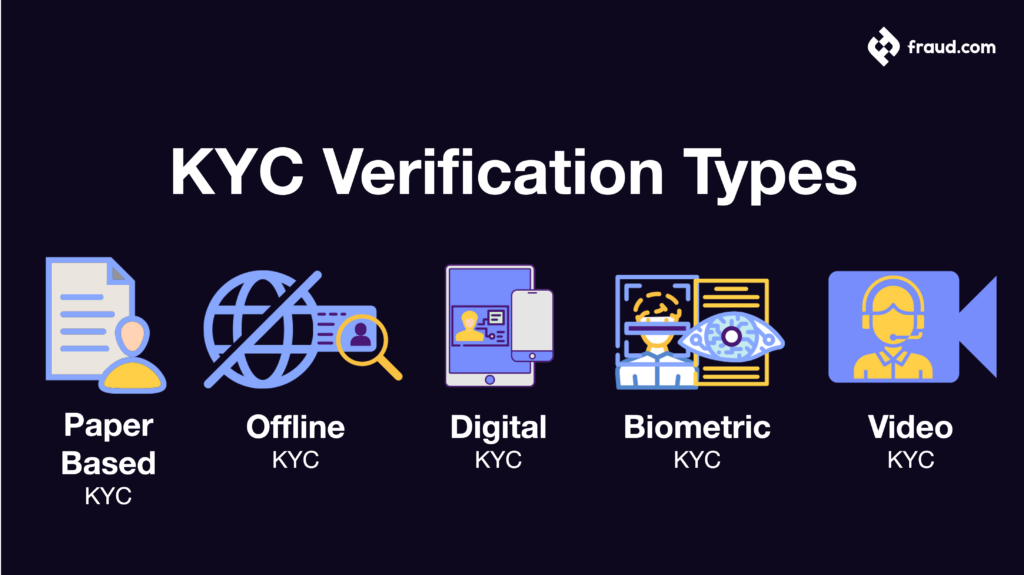
KYC checks can take many different forms, depending on the business and the level of risk involved. Some of the main types of KYC checks include:
1. Paper-based KYC
The most basic form of KYC checks is paper-based KYC. Customers are typically required to submit physical copies of their documents, which are then reviewed by someone at the company. These physical documents include things like passports, driver’s licenses, and utility bills.
Paper-based KYC checks are initially relatively simple and inexpensive to implement, but they can be time-consuming and costly as there is also a higher risk of fraud with paper-based KYC checks because it’s easier for criminals to forge or alter physical documents.
2. Offline KYC
Another common type of KYC check is offline KYC. With offline KYC, businesses require customers to provide physical copies of their documents, but these documents are then scanned and stored electronically. This allows businesses to review and verify customer identities more easily.
Like paper-based KYC, offline KYC is typically used for low-risk customers. It’s more secure than paper-based KYC, but it can still be time-consuming and expensive to implement.
3. Digital KYC
Digital KYC checks are conducted entirely online. Customers are typically required to submit digital copies of their documents, which are then reviewed by someone at the company. These digital documents include things like passports, driver’s licenses, and national identity cards.
Digital KYC checks are more secure than paper-based or offline KYC checks, as it’s more difficult to forge or alter digital documents. They are also more convenient for both, the businesses and customers, as there is no need to use physical copies of documents.
4. Biometric KYC
Biometric KYC checks use physical characteristics, such as fingerprints or iris scans, and face to verify customer identities. They are typically used in along other types of KYC checks, such as paper-based, offline, or digital KYC checks.
Biometric KYC checks are more secure than other types of KYC checks, as it’s very difficult to forge or alter someone’s physical characteristics, especially if liveness detection in also used.
Since biometric checks were first implemented about five decades ago, they have become increasingly common. In fact, the global biometrics industry is expected to surpass $136 million by 2031.
5. Video KYC
Video KYC checks are conducted via a video call, assisted by a KYC agent. Customers are typically required to submit digital copies of their documents, which are then reviewed by someone at the company. These digital documents include things like passports, driver’s licenses, and national identity cards.
During the video call, customers are also asked to verify their identities by showing their faces and providing other identifying information, such as their full name and date of birth. Thanks to video KYC, companies can verify their customers’ identities in real time from anywhere in the world. Besides, the emergence of machine learning (ML) and artificial intelligence (AI) has made it possible for companies to automate parts of the video KYC process, making it even more efficient.
In which industries can KYC verification be used?
Just about any business that deals with customer information can benefit from KYC verification. KYC checks help businesses to ensure that their customers are who they say they are, which reduces the risk of fraud and identity theft.
Some of the most common industries that use KYC verification include:
Banking: Given that most scams are financially motivated, financial institutions like banks are some of the most frequent users of KYC checks. Banks use KYC to verify the identities of their customers and prevent fraud such as account takeover, phishing, identity fraud, money laundering, terrorist financing, and other financial crimes.
In the past, banks would typically require customers to submit paper copies of their documents, which could be time-consuming and expensive to process. However, thanks to advances in technology, banks can now verify customer identities using digital KYC checks.
Cryptocurrency exchanges: Crypto fraud is more common than you may think, with criminals stealing an astounding $14 billion worth of cryptocurrency assets in 2021. While this was a record-breaking year for crypto scams, it’s likely that the number of scams will only increase in the coming years.
KYC checks can help crypto exchanges to prevent fraud such as crypto fraud and NFT scams by protecting their customers’ crypto assets. By verifying the identities of their customers, exchanges can ensure that criminals are not using stolen or fake identities to open accounts.
Gaming and betting: The gaming and betting industry is another common target of fraudsters. In addition to identity theft, gaming and betting companies also must worry about things like money laundering and underage gambling.
KYC checks can help gaming and betting companies to prevent these types of crimes by verifying the ages and identities of their customers.
Insurance: Like banks, insurance companies deal with large sums of money and are, therefore, a common target of fraudsters. KYC checks can help insurance companies to prevent fraud and ensure that their customers are who they say they are.
In addition, KYC checks can also help insurance companies to assess the risk of their customers. For example, if an insurance company knows that a customer has a history of making fraudulent claims, they may be more likely to refuse coverage.
Travel and tourism: Organisations operating in the travel and tourism industry often deal with complex checks and controls. They can benefit from KYC checks to enable a smooth and improved customer travel experience.
For instance, if remote KYC checks are done, this will enhance the user experience by decreasing the time which customers spend in queues and crowds. Leading to the removal of pain points which cause high customer friction.
What are the KYC norms?
The KYC norms are a set of standards that businesses must follow when verifying the identities of their customers. Some of the key requirements of the KYC norms include:
- Obtaining and verifying customer information
- Identifying and verifying the identity of beneficial owners
- Conducting due diligence on customers
- Keeping records of KYC checks
- Reporting suspicious activity to authorities
Businesses that fail to comply with the KYC norms may face financial penalties or be blacklisted by governmental or financial regulatory bodies such as the Financial Conduct Authority (FCA) in the UK or the Financial Action Task Force on Money Laundering (FATF).
Visual ID check and digital verification with KYC
KYC involves verifying the identity of customers using a combination of methods, including visual ID checks and digital verification. Visual ID checks involve comparing the customer’s face to their photo ID, such as a passport or driver’s license. This can be done in person or using remote KYC checks such as Biometric Identity Verification.
Digital verification, on the other hand, involves verifying the customer’s identity using digital documents, such as an electronic ID card or passport.
Know Your Customer FAQ
| Question | Answer |
|---|---|
| What is Know Your Customer (KYC)? | KYC is a process used by organizations to verify the identity of their customers and assess the risk associated with their activities. |
| Why is KYC important? | KYC is important for preventing financial crimes such as money laundering, fraud, and terrorist financing, as well as ensuring regulatory compliance. |
| What are the key components of KYC? | The key components of KYC include customer identification, customer due diligence, and enhanced due diligence for high-risk customers. |
| How does KYC benefit organizations? | KYC benefits organizations by enhancing security, ensuring regulatory compliance, and building trust with customers. |
| What challenges are associated with KYC? | Challenges associated with KYC include regulatory complexity, resource demands, data management issues, and customer experience friction. |
| How can organizations address KYC challenges? | Organizations can address KYC challenges through diligent regulatory compliance, resource allocation, technology integration, and risk management. |
| What role does technology play in KYC processes? | Technology plays a crucial role in automating KYC processes, improving efficiency, accuracy, and compliance with regulatory requirements. |
| How can customers contribute to the KYC process? | Customers can contribute to the KYC process by providing accurate and up-to-date information, as well as cooperating with verification procedures. |
| What are the consequences of non-compliance with KYC? | Non-compliance with KYC regulations can result in legal penalties, financial losses, reputational damage, and loss of trust from regulatory authorities. |
Our KYC Solution – Udentify
Now that you know more about KYC and its benefits, you may be wondering how you can implement KYC checks in your business.
One way to do this is by using Udentify. Udentify makes it easy to verify the identities of your customers, whether they’re opening a bank account, buying insurance, or gaming online. With Udentify’s six layers of security, your company is guaranteed fool proof KYC compliance. It’s no wonder Udentify is trusted by companies from a wide range of industries, including banking, insurance, crypto exchanges and gaming.
If you’re ready to take your KYC compliance to the next level, get in touch with us today and learn how Udentify can usher you into a new era of Identity Verification and authentication.
Take KYC checks seriously
KYC checks may seem like a hassle, but they’re a necessary part of doing business in today’s world. By verifying the identities of your customers, you can help to prevent fraud and protect your customers’ and company’s assets. KYC checks can also help you to make sure that your customers are who they say they are, and most importantly make your KYC process fast and smooth for a better customer experience and retention.

